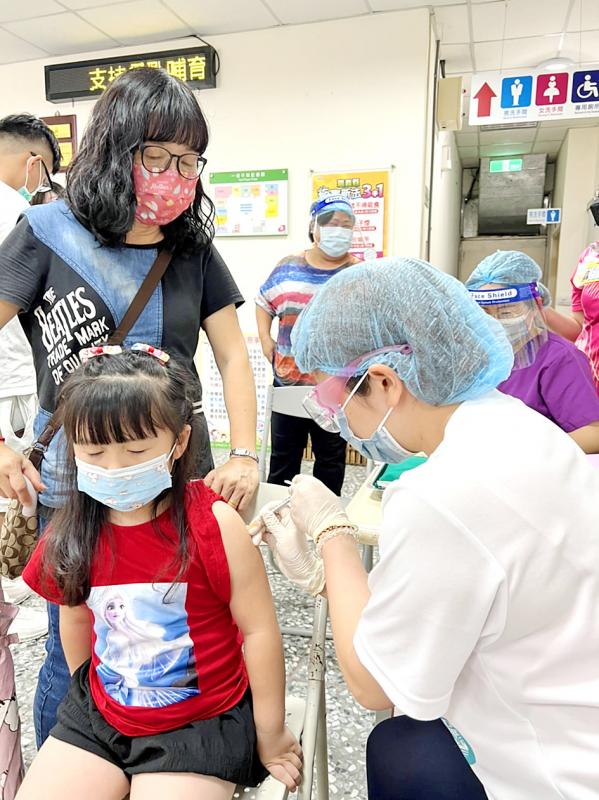Five hundred days after being infected with COVID-19, only 30 percent of 260 people studied retained a sufficient number of antibodies to protect them from future infections, a study commissioned by the Centers for Disease Control found.
Of the 30 percent, those with the highest number of antibodies had either been vaccinated after recovering from the disease, or had experienced severe symptoms, the centers said, adding that based on the findings, it recommends that people who have had COVID-19 still get vaccinated.
The centers commissioned National Yang Ming Chiao Tung University to perform the study using data from Jan. 22, 2020 to July 31 last year.

Photo courtesy of Chiayi County Government via CNA
ANTIBODIES
Wu Chun-chung (吳俊忠), who heads National Yang Ming Chiao Tung University’s Department of Biotechnology and Labratory Science in Medicine, on Sunday said that the research team used antibody tests from Swiss pharmaceuticals company Roche Holding AG to test 487 samples for antibodies, while another 376 samples were sent to Academia Sinica to be tested for neutralizing antibodies.
The number of people in Taiwan who had COVID-19 was low when the team began its study, so many of those included in the data were added after May last year, Wu said.
Whether subjects in the study continued to participate after one year, whether their samples were kept by the hospitals where they were originally treated and other factors affected the quantity of data the team had access to, he said.
“The globally agreed-upon standard is that 45.97 international units per milliliter of blood is enough neutralizing antibodies to offer protection against COVID-19,” Wu said. “In our study, about 30 percent of the subjects had this level of protection 500 days after recovery from the disease.”
The team also considered other factors such as body mass index, gender, age, living environment and whether the subject was a smoker, he said, adding that generally those who experienced more severe COVID-19 symptoms retained a greater number of antibodies.
EARLY VARIANTS
Although the majority of the subjects tested had been infected with earlier variants of SARS-CoV-2, the antibodies they retained still provide some protection against the Omicron variant of SARS-CoV-2, Wu said.
However, in terms of antibodies retained following vaccination, the team is continuing its research, as the subjects in the study had mostly been vaccinated with the same brand of vaccine, and had mostly only had only one shot, he said.

NO HUMAN ERROR: After the incident, the Coast Guard Administration said it would obtain uncrewed aerial vehicles and vessels to boost its detection capacity Authorities would improve border control to prevent unlawful entry into Taiwan’s waters and safeguard national security, the Mainland Affairs Council (MAC) said yesterday after a Chinese man reached the nation’s coast on an inflatable boat, saying he “defected to freedom.” The man was found on a rubber boat when he was about to set foot on Taiwan at the estuary of Houkeng River (後坑溪) near Taiping Borough (太平) in New Taipei City’s Linkou District (林口), authorities said. The Coast Guard Administration’s (CGA) northern branch said it received a report at 6:30am yesterday morning from the New Taipei City Fire Department about a

IN BEIJING’S FAVOR: A China Coast Guard spokesperson said that the Chinese maritime police would continue to carry out law enforcement activities in waters it claims The Philippines withdrew its coast guard vessel from a South China Sea shoal that has recently been at the center of tensions with Beijing. BRP Teresa Magbanua “was compelled to return to port” from Sabina Shoal (Xianbin Shoal, 仙濱暗沙) due to bad weather, depleted supplies and the need to evacuate personnel requiring medical care, the Philippine Coast Guard (PCG) spokesman Jay Tarriela said yesterday in a post on X. The Philippine vessel “will be in tiptop shape to resume her mission” after it has been resupplied and repaired, Philippine Executive Secretary Lucas Bersamin, who heads the nation’s maritime council, said

REGIONAL STABILITY: Taipei thanked the Biden administration for authorizing its 16th sale of military goods and services to uphold Taiwan’s defense and safety The US Department of State has approved the sale of US$228 million of military goods and services to Taiwan, the US Department of Defense said on Monday. The state department “made a determination approving a possible Foreign Military Sale” to the Taipei Economic and Cultural Representative Office in the US for “return, repair and reshipment of spare parts and related equipment,” the defense department’s Defense Security Cooperation Agency said in a news release. Taiwan had requested the purchase of items and services which include the “return, repair and reshipment of classified and unclassified spare parts for aircraft and related equipment; US Government

More than 500 people on Saturday marched in New York in support of Taiwan’s entry to the UN, significantly more people than previous years. The march, coinciding with the ongoing 79th session of the UN General Assembly, comes close on the heels of growing international discourse regarding the meaning of UN Resolution 2758. Resolution 2758, adopted by the UN General Assembly in 1971, recognizes the People’s Republic of China (PRC) as the “only lawful representative of China.” It resulted in the Republic of China (ROC) losing its seat at the UN to the PRC. Taiwan has since been excluded from